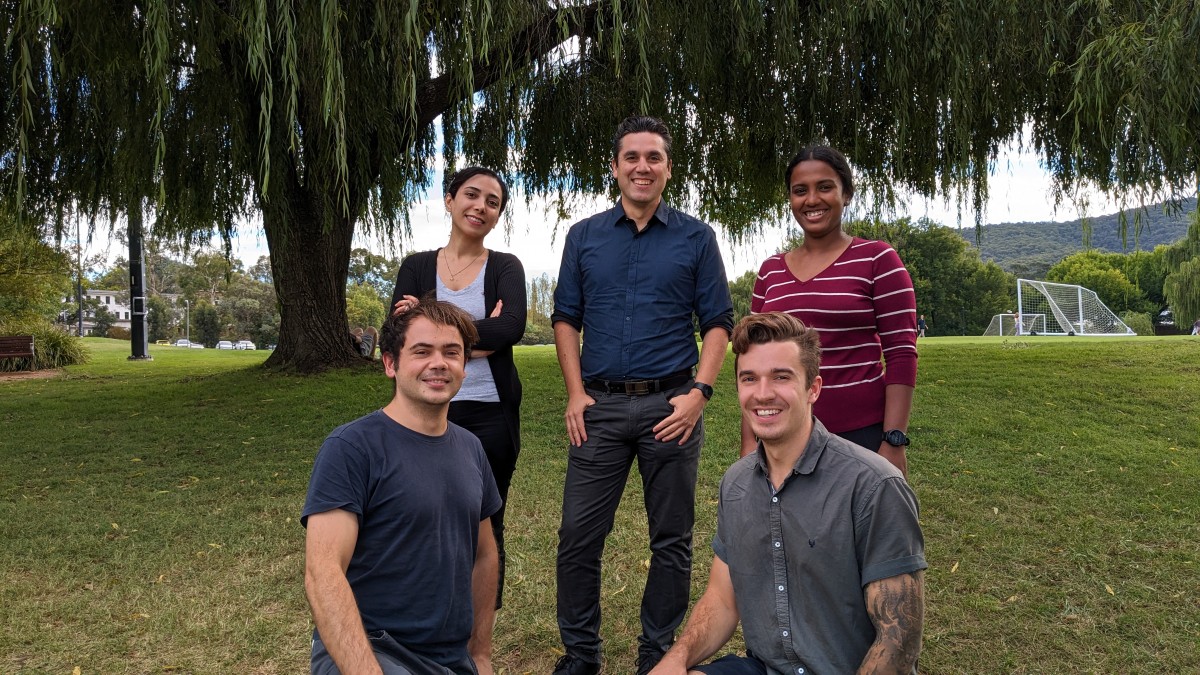Generosity of spirit and time make this mentor shine

Riccardo Natoli with some of his mentees: From back row, left to right: Sarah Farzadi, Natoli, Rakshanya Sekar, Adrian Cioanca, Nicholas Bariesheff.
When asked ‘what makes Associate Professor Riccardo Natoli special?’ there are consistent themes shared among the students and early career academics that he supervises.
In a nutshell, it is his generosity of spirit and time, and his dedication to developing the individual to be the best they can be that makes him an outstanding and sought-after supervisor and mentor.
Although all his mentees start their journey in the Clear Vision lab undertaking research, the way Associate Professor Natoli nurtures each person’s strengths and addresses their weaknesses is with a much wider lens, and goes far beyond the research.
Dr Joshua Chu Tan, a former post-doctoral fellow who under the tutelage of Riccardo has moved into consulting, said “I never felt constrained with my options during my time in the lab. The goal for Riccardo was never to make me the best researcher but the best person I could be, setting me up for life well beyond the academic corridors.”
Dr Adrian Cioanca, a current postdoctoral fellow, added, “Riccardo has actively facilitated my involvement in several commercial partnerships and intellectual property discussions. He is exceptionally supportive in sharing his extensive network of contacts within industry and academia and he is very skillful at establishing research partnerships and collaborations.”
Never one to rest on his laurels, Associate Professor Natoli continually looks for opportunities to strengthen his own supervision and mentoring skills recently completing a mentorship program targeted at supporting women in science.
Dr Yvette Wooff, a postdoctoral fellow, currently working in Riccardo’s lab said, “When I started my PhD in another group I was struggling. After a hallway conversation, Riccardo took it upon himself to jump into action. Within a few weeks I was able to start a new PhD project under his supervision.”
“Being a single parent, he also allowed me flexibility and had understanding of my parental responsibilities, showing his excellence in supervision by ensuring equity in the workplace.”
“Without Riccardo’s unconditional support, I would not have completed a PhD or remained in academia. He allowed me to see that someone believed in me and my capabilities as a developing researcher,” Yvette explained.
Associate Professor Natoli’s empathic nature, as well as his flexible and collegial approach, has created a team culture that students feel privileged to belong to and a sense of belonging that positively impacts their motivation.
Ms Sara Farzadi, a Phd Student said, “One of Riccardo’s strengths as a leader is fostering teamwork and creating a friendly and harmonious atmosphere in the lab.”
“He encourages group members to support each other, and he appoints postdocs as secondary supervisors for students. This approach provides professional development for the postdocs and also benefits the students as we receive additional support and different perspectives,” Ms Farzadi advised.
Ms Rakshanya Sekar, also a PhD student added, “I have always admired Riccardo’s ability to bring together people to create a close knit lab family, where everyone feels heard and valued.”
“Since day one, he has gone above and beyond the traditional role of a supervisor, often taking on the role of a mentor, a trusted friend and a critical advisor when needed.”
“He has worked with me to shape my research path to align with my interests and aspirations, encouraging me to collaborate with not only academic research labs but also industry leaders, providing opportunities rare for most PhD students.”
Associate Professor Riccardo Natoli receiving the award from ANU Vice Chancellor and President Professor Genevieve Bell at the VC Awards Ceremony. Photo: ANU Media.
Associate Professor Riccardo Natoli has been recognised for his outstanding ability to mentor talented students and early career researchers with the Vice-Chancellors Award for Excellence in Supervision.
This article first appeared at ANU College of Science and Medicine.

